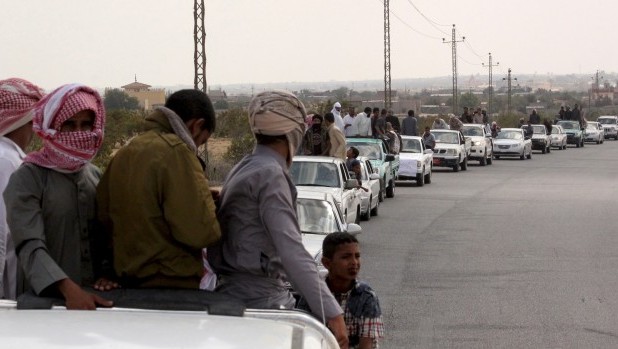
A funeral convoy carrying the bodies of four Islamist militants drives through Sheikh Zuweid, in the north of the Sinai peninsula, on August 10, 2013. (Retuers/Stringer)
Cairo, Asharq Al-Awsat—Four members of a Jihadist group based in Egypt’s Sinai peninsula were buried yesterday, a day after they were killed in an alleged Israeli drone attack.
Ansar Beit Al-Muqqadas (“Supporters of Jerusalem”) said five of its members were attacked on Friday as they were preparing to launch a rocket into Israel.
The attack, which resulted in the death of four of the extremists, sparked controversy in Egypt, which has been gripped by an ongoing political crisis since the military ousted former president Mohamed Mursi, a member of the Muslim Brotherhood.
In a statement, the spokesman for the Egyptian armed forces, Ahmed Mohamed Ali, denied an Israeli role in the incident. He said that there was “no truth in form or substance to the presence of any Israeli attacks on Egyptian territory.”
The spokesman added that rumors about Egyptian and Israeli prosecutors coordinating with one another over the militants being targeted were false. “The Egyptian border is a red line. It has not and will not be allowed to be harmed.”
The military statement followed press reports that Israeli aircraft had targeted gunmen. The Reuters news agency reported that five security sources had earlier confirmed that Israel had carried out a missile strike that killed the militants as they prepared to launch rockets at Israel.
One source added that “Israeli aircraft had observed the militants preparing three rocket launchpads to hit Israel. It launched a missile, killing two men, then killed another pair who stepped up to the launchpads after the first strike,” Reuters reported.
A statement attributed to the Supporters of Jerusalem, which launches its operations from central Sinai, also affirmed that four of its members were killed in a raid by an Israeli drone. It claimed that they had been preparing to launch rockets at Israel, close to the Egyptian border with Israel.
Asharq Al-Awsat obtained a copy of the statement, which claimed that the unmanned Israeli aircraft breached Egyptian airspace by more than three miles. The commander of the operation was the only survivor.
The statement went on to list the deceased members: “Hussein Ibrahim Salem Al-Tihi, of the Tayaha tribe, a resident of the Cherizah village in central Sinai; Yasri Muharrib Al-Sawarkah, from the Suwarkah tribe; Ibrahim Khalaf Al-Mania’y, of the Sawarkah tribe and a resident of the Mahida village; and Muhammad Hussein Malki of the Sawarkah tribe and a resident of the village of Mahdia.”
A funeral for the four militants was held Saturday. Witnesses said that it was attended by roughly 3,000 people, travelling in nearly 400 cars. Several villages turned out to the Sheikh Zowayed city cemetery were they were buried.
Witnesses pointed out that the majority of those attending the funeral were thought to be members of Islamist movements or jihadists, since they waved the black flag that is a hallmark of the Al-Qaeda organization.
There has been an increase in extremist activities in the Sinai since the ousting of Mohamed Mursi that took place on July 3. Operations targeting the natural gas pipeline that connects Egypt, Israel and Jordan swiftly resumed. They had stopped during the Mursi’s time in office.
Many security and military forces stationed in the Sinai have also been targeted, including a number of high-ranking officials.
The power and authority wielded by tribal elders has likewise receded as a result of the funds flowing from organized smuggling operations between Egypt and the Gaza strip—controlled by Hamas—through a network of tunnels.
